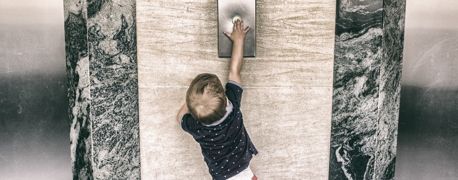Dirty Hands? 5 “Cleaners” That Cause Dangerous Health Risks

If you work in the oil industry, you know just how difficult it can be to get your hands clean. Regular hand soap won’t cut through the oil on your skin, and regular laundry detergent isn’t enough to clean your clothes. Many oil riggers and their spouses often turn to alternative cleaning methods that, while relatively effective, can be incredibly dangerous.
In this blog, we will look at 5 different types of “cleaners” that oil rig workers, pipeline workers, and auto mechanics often use and explain safer alternatives to these dangerous chemicals.
#1. Brake Cleaner
If it’s good enough to clean grease from brakes, it’s going to work on hands, right? Wrong. Not only is brake cleaner made up of toxic chemicals, but it’s also an OSHA violation to use it in a way other than intended. Brake cleaner can be absorbed through the skin, so although it may work to remove the grease, having direct skin contact with it (such as handwashing) can expose your body to carcinogens that can not only have damaging effects in the short-term, but can also cause cancer. Not to mention this solvent is flammable!
One of the main ingredients in brake cleaner is often tetrachloroethylene, or perchloroethylene, which can cause serious health risks through both short-term and long-term exposure. When exposed to temperatures above 315 degrees Celsius, such as in welding, tetrachloroethylene becomes phosgene, an extremely poisonous gas that was used as a chemical weapon during World War 1.
#2. WD-40
Most everyone has a can of WD-40 in their garage, but industrial workers have even more exposure to this solvent. While it’s mostly used as a lubricant, WD-40 is also effective as a rust preventative solution and an adhesive remover. But is it toxic?
The dangers associated with the first ingredient listed on consumer WD-40 cans include:
- Cancer
- Respiratory issues
- Damage to an unborn child
- Drowsiness
- Dizziness
- Genetic defects
- Skin irritation
- Death, if ingested
The second ingredient, petroleum base oil, is also considered a carcinogen, because it releases volatile organic compounds (VOCs) into the air. Repeated skin contact with WD-40 can cause irritation and even dermatitis, so it should be used with gloves – not to wash hands or clothes.
#3. Kerosene
Especially when used to clean hands after contact with oily materials, kerosene can be incredibly dangerous; one study found that cleaning with kerosene “facilitates passage of carcinogens through the skin.” This dramatically increases the likelihood of genetic damage in critical organs, including cancer. Skin exposure to kerosene can also cause burns, itchiness, and rashes with blisters.
#4. Gasoline
Kerosene is just one of the many dangerous ingredients of gasoline. Even just spilling gasoline on yourself at the gas station can be serious and should be dealt with carefully. Skin exposed to gasoline should be rinsed with water and washed with a non-abrasive soap; affected clothes should be carefully rinsed and may even need to be thrown away. Because gasoline is flammable, these clothes should never be put through the dryer, at risk of fire.
#5. Paint Thinner
Because paint thinner, also known as mineral spirits, contains hydrocarbons, exposure through inhalation or touch can cause poisoning. Skin contact can cause numbness in fingers and arms, dry skin, and dermatitis. It can also cause burns and eye conjunctivitis. The best course of action? Follow the warnings on the label: avoid repeated or prolonged skin contact. Never use paint thinner to clean hands.
How Do You Wash Oil Off Your Skin Safely?
When you need thorough cleaning and regular soap won’t cut it, you don’t need to turn to dangerous solvents to get the job done. There are plenty of alternatives that are effective and safe and won’t require hours of scrubbing with a nail brush.
Safe handwashing alternatives to solvents include:
Soap containing pumice: Pumice is a type of volcanic rock that has been used for centuries as an abrasive cleaning agent. It’s highly effective for removing oil and grease due to its porous nature. Soap containing pumice can gently exfoliate and cleanse the skin, removing oil without causing excessive drying or irritation.
Citrus-based cleaners: Citrus-based cleaners are another effective way to remove oil. These cleaners contain d-limonene, a naturally occurring solvent found in citrus fruits. D-limonene can cut through oil and grease easily, leaving your skin clean and refreshed. Always follow up with a moisturizer to prevent your skin from drying out.
Dawn dish soap: Dawn dish soap is a surprisingly effective way to remove oil from the skin. It is designed to cut through grease on dishes, and it works equally well on skin. However, it can be a bit harsh, so it’s best to use this method sparingly and to follow up with a good moisturizer.
Coffee scrub: While a bit unconventional, coffee grounds can act as a natural scrub, helping to remove oil from your skin. The caffeine in coffee also has antioxidant properties which can rejuvenate the skin. Mix coffee grounds with a small amount of liquid soap or water to create a paste, then gently scrub the skin.
Baby oil: Baby oil might seem like an unusual choice for removing oil, but the principle of "like dissolves like" applies here. Applying a thin layer of baby oil to your skin can help to dissolve the unwanted oil, which can then be washed off with a mild soap. Baby oil is also gentle on the skin, reducing the risk of irritation.
Olive oil: Just like baby oil, olive oil can also be used to remove other oils. The principle is the same: like dissolves like. However, olive oil also contains antioxidants and vitamin E, which are beneficial for the skin. After applying olive oil and removing the unwanted oil, make sure to wash your skin thoroughly to prevent any residual olive oil from clogging your pores.
Keeping Oil Workers Safe
Industrial workers are regularly exposed to dangerous chemicals as it is; cleaning those chemicals off your hands or clothes shouldn’t put you in harm’s way, too. It’s important to get hands as clean as possible after the working day is done, and the safe alternatives to solvents listed above can help. By choosing the right cleaner for your skin and following up with a moisturizer, you can keep your skin healthy and free from oil-based irritants.
- Categories


